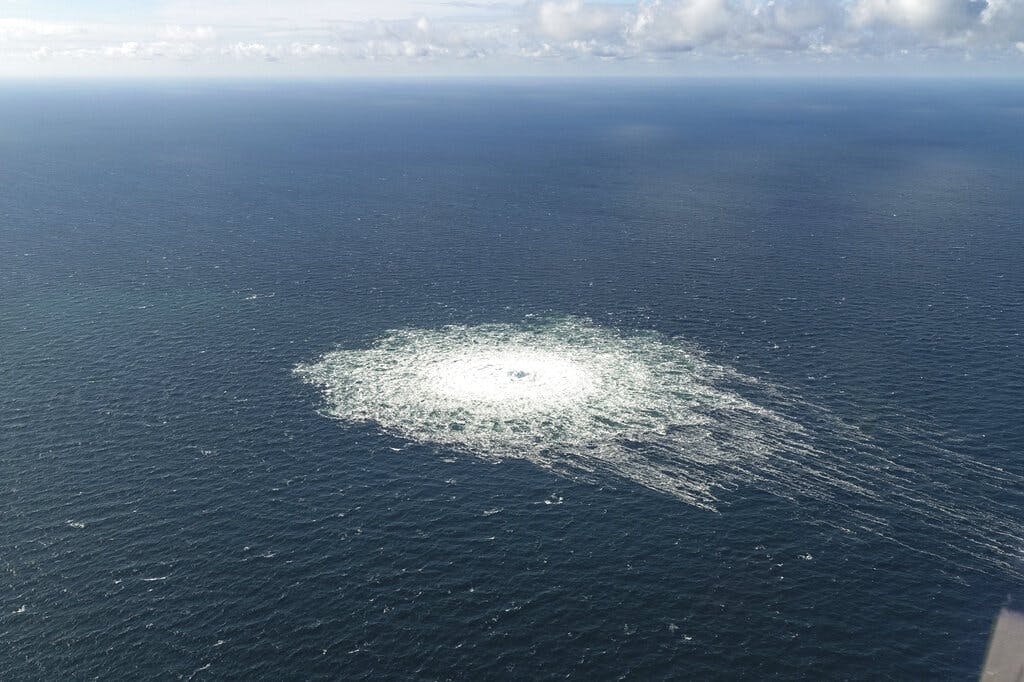Explosions and Intrigue as Russia Is Suspected of Sabotaging Its Own Pipelines
‘The arrow points in the direction of Russia,’ one analyst said. ‘No one in the West is interested in having any kind of instability in the energy market.’

A series of three unusual leaks and two explosions emanating from two strategic gas pipelines running under the Baltic Sea to Germany from Russia triggered concerns about sabotage Tuesday, along with environmental dangers and hazards for maritime traffic.
Late on Tuesday the Swedish national seismic network said it had detected two explosions. One blast occurred southeast of the Danish island of Bornholm and a slightly larger one was recorded later Monday northeast of the island. The latter explosion packed the force of a magnitude-2.3 earthquake.
Experts say Russia could be to blame as it seeks to further shake up natural gas markets amid an energy crisis sparked by its war in Ukraine, with the leaders of Poland and Denmark raising concerns that the leaks on the Nord Stream 1 and 2 pipeline were sabotage.
No official has yet presented evidence of what caused the Nord Stream problems, but in central Europe, where distrust of Russia runs high, there were fears Moscow sabotaged its own infrastructure out of spite or to warn that all pipelines are vulnerable to attack. The leaks emerged off the coasts of Denmark and Sweden, raising the stakes on whether energy infrastructure in European waters was being targeted and leading to a small bump in natural gas prices.
According to the Telegraph, the German newspaper Die Welt reported that the Nord Stream 2 pipeline, “which was meant to double Russian gas supplies to Germany,” had been partially destroyed, with gas leaks coming from the Baltic seabed.
The Polish prime minister, Mateusz Morawiecki, asserted, “We can clearly see that this is an act of sabotage, an act that probably means a next step of escalation in the situation that we are dealing with in Ukraine.” Ironically, prior to the Russian invasion of Ukraine, Germany’s chancellor, Olaf Scholz, referred to the Nord Stream 2 pipeline as an “apolitical” issue.
A researcher with the Center for Maritime Operations at the Royal Danish Defense College, Anders Puck Nielsen, said the timing of the leaks was “conspicuous” given a ceremony was just held for the Baltic Pipe, a long-awaited pipeline that will bring Norwegian gas to Poland in efforts to bolster Europe’s energy independence from Moscow. He said perhaps someone sought “to send a signal that something could happen to the Norwegian gas.”
“The arrow points in the direction of Russia,” Mr. Puck Nielsen said. “No one in the West is interested in having any kind of instability in the energy market.”
The extent of the damage means the Nord Stream pipelines are unlikely to be able to carry any gas to Europe this winter even if there was political will to bring them online, analysts at the Eurasia Group said.
“Depending on the scale of the damage, the leaks could even mean a permanent closure of both lines,” analysts Henning Gloystein and Jason Bush wrote.
They noted that undersea pipelines are designed in a way that they should not be accidentally damaged and leaks are rare.
“Leaks of this size are a severe safety and environmental hazard, especially should Russia not stop pumping gas into the system,” the analysts said.
Mr. Puck Nielsen said of possible sabotage that “technically speaking, this is not difficult. It just requires a boat. It requires some divers that know how to handle explosive devices.”
“But I think if we look at who would actually benefit from disturbances, more chaos on the gas market in Europe, I think there’s basically only one actor right now that actually benefits from more uncertainty, and that is Russia,” he said.
Asked if the leaks may have been caused by sabotage, the Kremlin spokesman, Dmitry Peskov, said “no version could be excluded.”
One of President Zelensky’s top aides was quick to blame Russia for what he termed a “terrorist attack” against the EU. Mykhailo Podolyak said via Twitter that “Russia wants to destabilize the economic situation in Europe and cause pre-winter panic,” adding that the “best response and security investment” would be “tanks for Ukraine — especially German ones.”
Construction on the Nord Stream 2 pipeline to Germany was completed last year but it has not yet been operational. Neither pipeline was pumping gas at the time the leaks and explosions were reported. However, both pipelines contain gas under pressure.
While the full extent of the damage was not immediately known, the risks posed by explosive gas are real. The Telegraph reported that Denmark has already restricted shipping in a five nautical mile radius to the Nord Stream 2 pipeline, and air traffic below about 3,280 feet near the restricted zone has been banned.
Methane gas bubbles exceeding 300 feet in diameter have reportedly been detected in the sea near the Danish island of Bornholm. Dramatic aerial photographs appeared to show some of the gas bubbling to the surface over a wide area of the sea above the pipelines.
